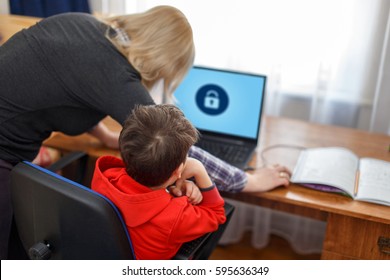Watch the following video on the following link: (Gable, 2020).
Questions for consideration:
What are some human flaws that translate poorly to Internet safety?
What are some rules that you set to keep online learning safe for students?
Is it the responsiblity for teachers or parents to educate students on safe social media and web use?

Parent Protecting Child Online (Stock Image)
Online Safety
The Internet is a wondeful tool for connecting with others, but it can also be a portal to danger. It is important for students to know that, even through parents and teachers may set safety rules for them, they are responsible for protecting their own safety online. It is the responsibility of educators then to model and set rules for students to adapt into their internet use, both for school and non-school activities. First, it is important for educators to realize the important position of influence they have over their students' life. It is also important for teachers to not assume that students are being taught how to use the Internet safely. They must take the intiative in educating their students.
It Lasts Forever
The most important thing for students to understand about the Internet is that much of what they post or send has the potential to last forever (Wellcast, 2013). Any immature, rude or unwise decision can come back to haunt them. For example, a man in New Hampshire had his rising poltical career derailed after posts about his past marijuana use became public knowledge (Seacoast Online, 2015). Another prominent business executive was fired after he published a tweet with racist undertones (Seacoast Online, 2015). Students need to understand that what they post will have consquences (Seacoast Online, 2015). Students need to be taught to avoid posting personal information on the Internet (Kaspersky, n.d.). One particular trend students need to be taught to avoid is the sending of sexually explixt material or personal identifying infromation to people over the Internet. Students need to be taught to be extra careful when meeting people online (Kaspersky, n.d.).
Safe Browsing
Another important aspect of safe Internet use is teaching students how to browse safely. It is important for students to avoid clickbait, have strong passwords for personal accounts, be careful what download, and be careful about where they make online purchases (Kaspersky, n.d.). Students need to understand that clickbait is any add or advertisement that is intentionally made to generate interest (Zook, 2019). The reason to avoid clickbait is that some people use clickbait to spread malware (Zook, 2019). Students need to be taught what exactly constitutes a reliable sight. I have a personal story about this. Once, I tried downloading a copy of the game Oregon Trail onto the family computer. Long story short, the sight was compromised and I accidentally downloaded a virus onto the computer. My mother used this as an oppurtunity to educate me about the need to be more careful about what I downloaded. Ideally, younger children should ask their parents before downloading something. Had I been taught this protocol before I downloaded, my family would have avoid the cost and inconvenience of a computer virus, However, older students need to be taught to recognize what is safe to check out, such as not clicking on advertisements that use click-bait to lure web patrons (Kaspersky, n.d.).
Device Safety
Lastly, students need to be taught how to properly care for their personal devices. Some schools, such as the district my mom teaches in, has electronic devices for students to use in class with Google classroom and Internet connection. It is important for educators to include instruction on how to take care of the device, especially if students are allowed to remove the device from the school ground. Students need to understand how to set strong passwords for the device, how to ensure their anit-virus software is up to date, and to keep the device clean (Kaspersky, n.d.). There also needs to be a policy to account for lost tech if students are allowed to take home school owned devices to encourage students to ensure students care for the device.

Beware what you share button (Whats Up Newp Crew, 2017).
Assignment
Critically evaulate your own web safety habits using the resources below. Think of principles to share with your class from this exercise. (For example, I am going to change usernames for several websites, because they use parts of my given name in them).
Additional Resources
References
Gable, J. (2020, Jan 2). Online safety-it is not about the internet [Video File]. [Ted Talks]. YouTube. Retrieved from https://www.youtube.com/watch?v=eTTer3-RmFw&app=desktop.
Kaspersky (n.d.). Top 10 internet safety rules & what not to do online. Kaspersky. Retrieved from https://usa.kaspersky.com/resource-center/preemptive-safety/top-10-internet-safety-rules-and-what-not-to-do-online.
[Photograph of mother locking on computer screen for son, parental control]. Retrieved May 30, 2020, from: https://www.shutterstock.com/image-photo/mother-locking-on-computer-son-parental-595636349.
Seacoast Online (2015, Jun. 30). Careless online posts can come back to haunt you. Seacoast Online. Retrieved from https://www.seacoastonline.com/article/20150630/NEWS/150639991.
WatchWellCast (2013, May 2). Safe web surfing: Top tips for kids and teens online [Video File]. YouTube. Retrieved from https://www.youtube.com/watch?v=yrln8nyVBLU&app=desktop.
What's Up Newp Crew (2017, Jan 6). Social media safety: Beware what you share. Retrieved from https://whatsupnewp.com/2017/01/social-media-safety/.
Zook, C. (2019, Dec. 10). What is digital citizenship. Applied Educational Systems. Retrived from https://www.aeseducation.com/blog/what-is-digital-citizenship.